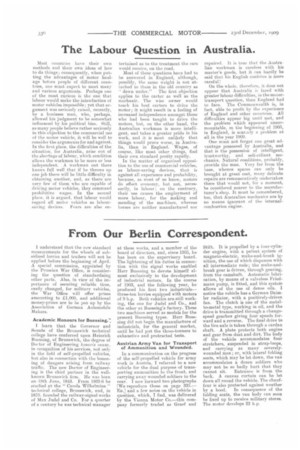The Labour Question in Australia.
Page 4

If you've noticed an error in this article please click here to report it so we can fix it.
Most countries have their own methods and their own ideas of how to do things; consequently, when putting the advantages of motor haulage before people of different countries, one must expect to meet many and various arguments. Perhaps 0110 of the most curious is the one that labour would make the introduction of motor vehicles impossible; yet that argument was seriously raised, recently, by a business man, who, perhaps, allowed his judgment to be somewhat influenced by his political bias. Still, as many people believe rather seriously in this objection to the commercial uso of the motor vehicle, it will be well to consider the arguments for and against. In the first place, the difficulties of the situation, for Australia, arise out of the shortage of labour, which condition allows the workmen to be more or less independent. A workman out there knows full well that if he throws up one job there will be little difficulty in obtaining another, and, as there are very few of them who are capable of driving motor vehicles, they command prohibitive wages. In the second place, it is argued, that labour would regard all motor vehicles as laboursaving device. Fears are also en
tertained as to the treatment the cars would receive, on the road.
Most of these questions have had to be answered in England, although, possibly, the same weight is not attached to them in the old country as " down under." The first objection applies to the carter as well as the mechanic. The wise owner would teach his best carters to drive the motor ; it might result in a feeling of increased independence amongst those who had been taught to drive the motors, but, au the other hand, the Australian workman is more intelligent, and takes a greater pride in his work, and it is most unlikely that things would prove worse, in Australia, than in England. Wages, of course, like most other things, find their own standard pretty rapidly.
In the matter of organized opposition to the use of commercial vehiele.s, as labour-saving devices, that is against all experience and probability, because, as most of us know, motors do effect economy, but not, necessarily, in labour ; on the contrary, their use causes the employment of more labour, for the making and mending of the machines, whereas horses are neither manufactured nor
repaired. It is true that the Austras lien workman is careless with his master's goods, but it can hardly be said that his English confrere is more careful: On the whole, therefore, it does not appear that Australia is faced with greater labour difficulties, in the motortransport question, than England had to face. The Commonwealth is, in fact, able to profit by the experience of England and other countries. All difficulties appear big until met, and the problem which appeared unsurmountable, in the beginning of 190.5, in England, is scar,3ely a problem at all in the year 1909.
One must not forget one great advantage possessed by Australia, and that is the possession of intelligent, trustworthy, and self-reliant mechanics. Natural conditions, probably, provide the man. Very far from the base, whence spares can only be brought at great cost, many delicate repairs are remuneratively undertaken there that would not, for a moment, be considered nearer to the manufacturer's shop. It must be remembered, too, that Australian mechnnies are by no means ignorant of the internalcombustion engine.




















